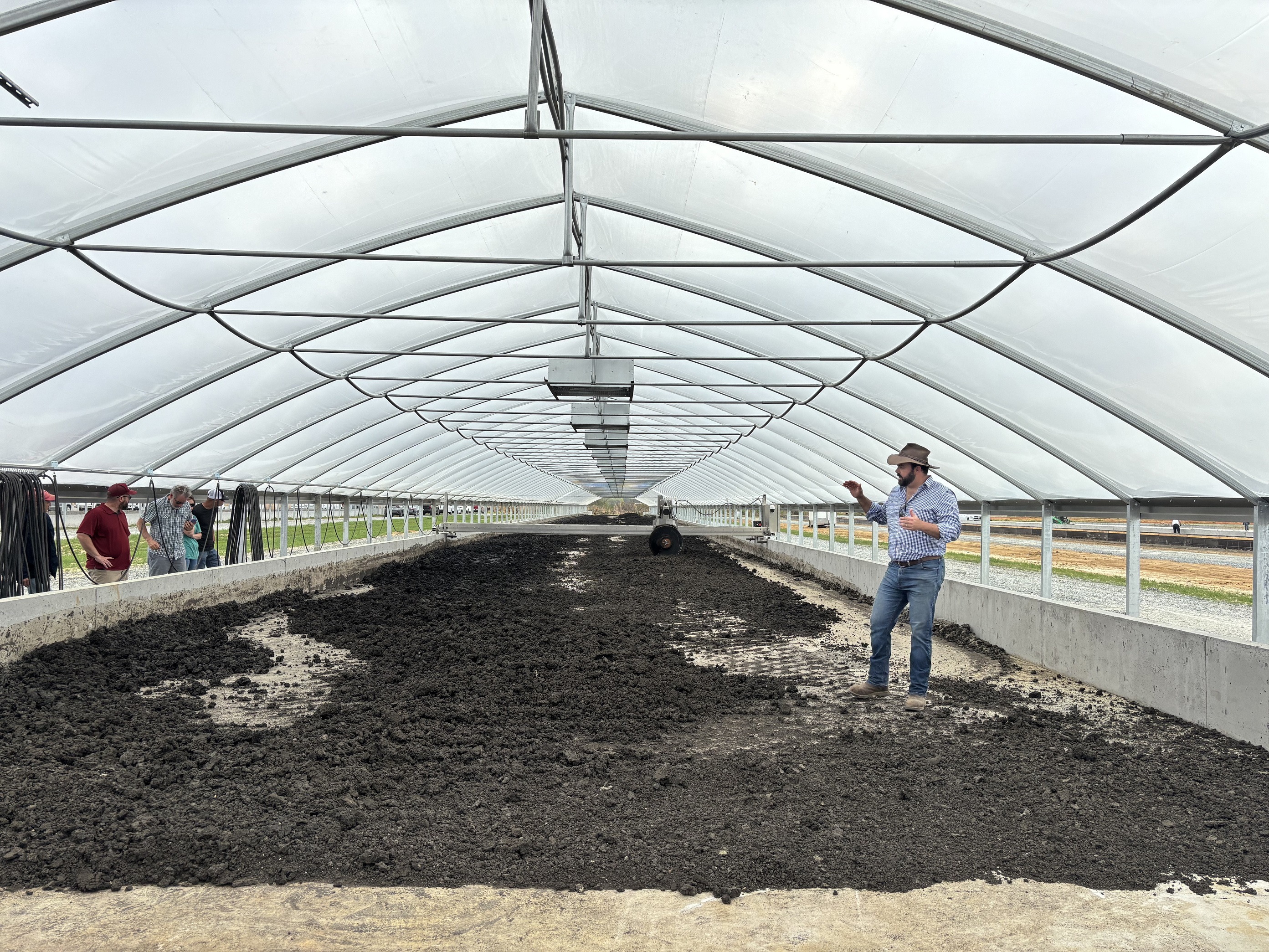
Agricultural innovation: Phinite celebrates grand opening of largest animal waste drying facility in North Carolina
By Stephanie Meador, posted Apr 17, 2025 on BizFayetteville.com

On April 4, Phinite proudly celebrated the grand opening of the Sampson County Sustainability Cluster, the largest animal waste drying facility in North Carolina. This milestone marks a major advancement in sustainable agriculture, offering hog farmers an efficient solution for managing lagoon sludge while producing high quality, environmentally friendly fertilizer.
“We were originally building these on farms, and the logistics of just having a large scale facility, given how close a lot of the farms are to each other, just made a lot more sense. So the way it works is we basically partner with hog farmers that are within a small radius of the facility, and we go and remove the nutrients from their lagoon and take it to the drying facility and then dry it out there. This location in Sampson County is one of those facilities. And then we take it to our plant and turn it into a premium organic fertilizer,” shared Phinite CFO Mike McCord.
This facility in Sampson County is the first to open, but Phinite is also currently working on facilities in Bladen and Duplin Counties. They have a separate manufacturing facility in Turkey, North Carolina where the dried material is turned into organic fertilizer and then sold throughout the country.
“Fertilizer is the reason why half the people in the world are alive today. Synthetic fertilizer was developed after World War II and allowed the human population to grow to what will be 10 billion people in 2050. The problem is that all of the ingredients in fertilizer that are responsible for keeping all of us alive are finite resources that are not sustainable in the long term. The world’s single biggest resource for renewable fertilizer is within the manure that exists within the food production system, and so I am dedicating my life to recycling that material, to create more food for people, more fertilizer for people, ultimately, to be able to feed the world going forwards. And that's what motivates me. In order to do that, we had to build a profitable model to mine and manufacture fertilizer from manure, and that’s what we've done here in North Carolina,” remarked CEO and Founder Jordan Phasey.
After the opening remarks, Jordan Phasey invited guests to tour the facility and explained the science behind their process. They use a long reach trackhoe to extract the thick bottom sludge out of the hog lagoon. Then they pump that material with a concrete pump into a sealed tanker trailer and bring it to the drying facility. The material is then deposited into the greenhouse where it is dried with ambient air.
“Our drying system is a shallow concrete basin covered by a greenhouse, and inside it is a robotic mixing device we have developed that mixes the material and assists it in drying. Our buildings are naturally ventilated, and we have fans in the top of the buildings that help bring air into the material to do the drying. This drying system, being naturally ventilated, is able to dry material much more quickly than a tunnel ventilated building, because the amount of energy present within the air that blows into this building is much, much greater than what just shines on the material from the sun,” explained Phasey.
When the material dries, it forms a crust on the surface and the drying rate slows down. To prevent this, the material needs to be mixed in order to keep bringing moisture up to the surface, and that’s what the robot does. Phinite’s robots operate continuously, running through the material and lifting up moist material that is down low. It takes about six to eight weeks for Phinite to dry and turn a building.
Once the material is dried they dig it out and transport it to their central processing facility in Turkey, NC. There they take this material and granulate it into a hard, round ball, and bag that material and sell it from there as organic fertilizer.
“The final fertilizer product that we produce has no odor, has a really high crush strength and a really low dust content, because we make round balls instead of jagged edges, all of those things together lead to a superior and premium fertilizer product,” explained Phasey.
Phinite’s process provides an innovative solution to waste management in the agricultural industry.
“The swine industry has been a cornerstone of the rural economy in North Carolina. Every farmer in North Carolina touches the swine industry, whether you’re a row crop farmer who is selling feed into the integrated livestock industry, whether you are a supplier of farm equipment, whether you’re part of the universities that are training people to work within the industry, this industry has fed and sustained a lot of people for the last 40 years. And the reason we’re here at Phinite is to enable the next 40 years of success within the swine industry by being able to take these residuals [and] get them out of North Carolina to people that want and need this product,” shared Phasey.
McCord shared that the facility is hiring. They’re primarily seeking mechanical technicians and mechanical engineers, and are sourcing candidates primarily in Sampson and adjacent counties.
To learn more about Phinite visit www.phinite-us.com.
Copyright © 2026
Enhanced Media Management Inc. dba
Greater Fayetteville Business Journal
This story may be displayed, reformatted and printed for your personal, noncommercial use only and in
accordance with our Terms of Service located at https://bizfayetteville.com/useragreement.